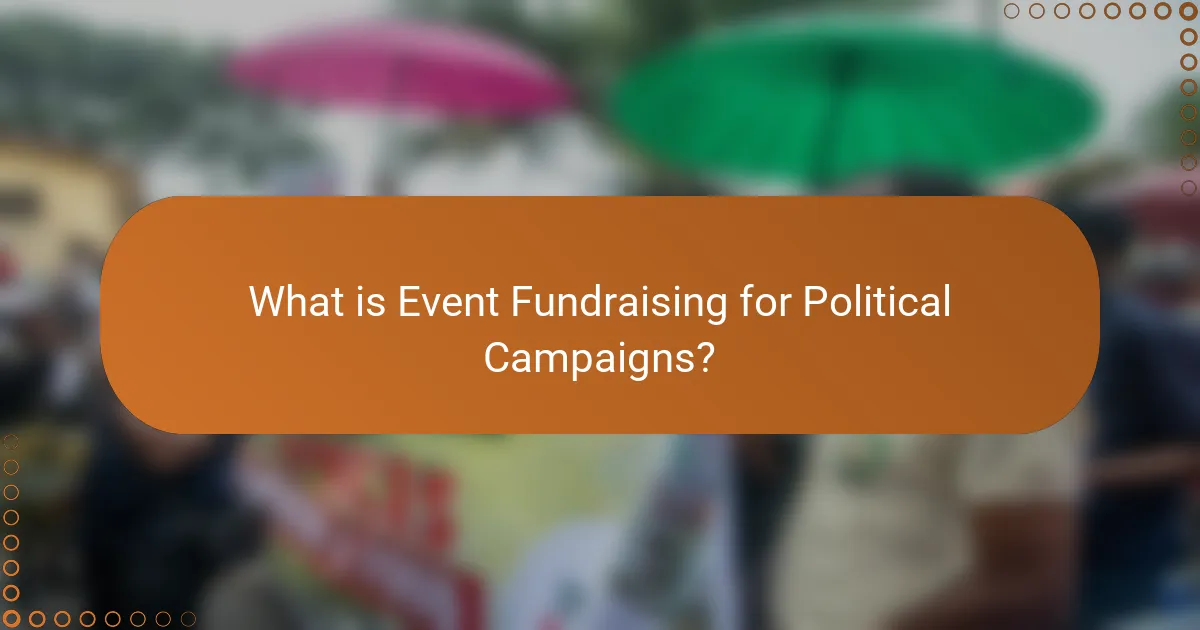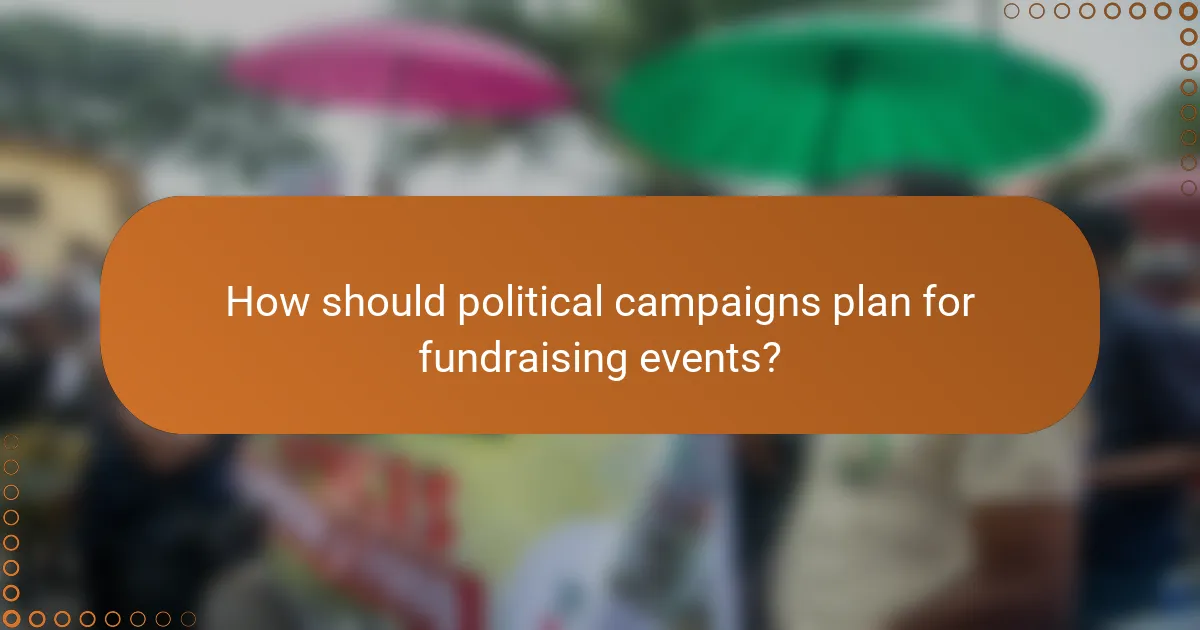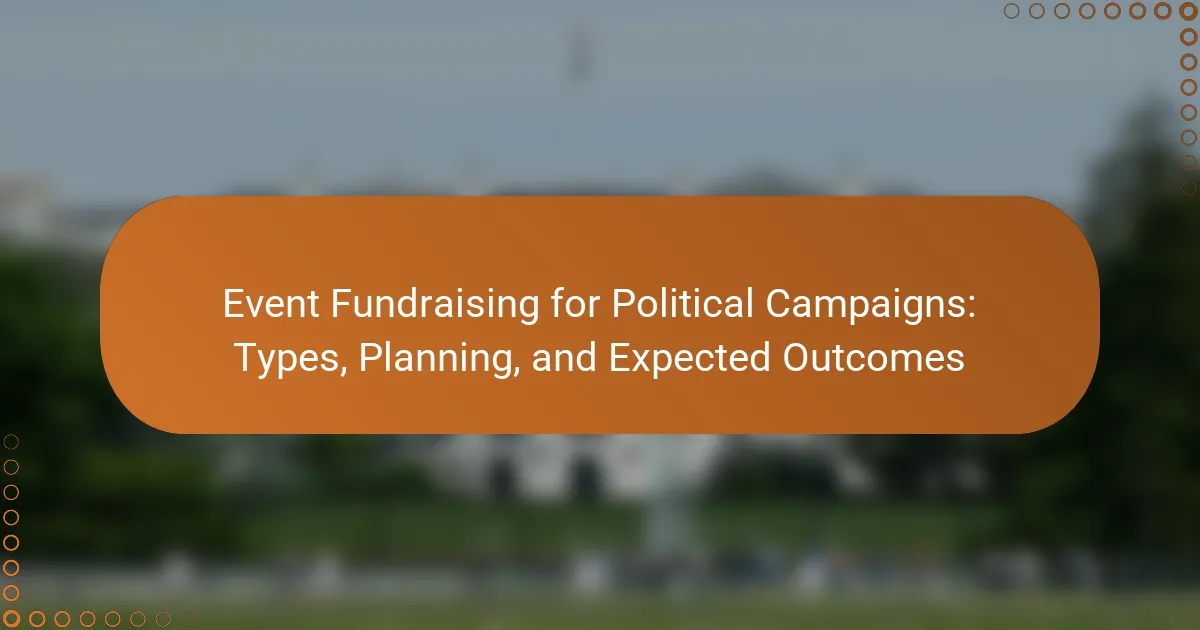Event fundraising is a strategy employed by political campaigns to generate financial support through organized gatherings such as dinners, auctions, and rallies. These events not only aim to raise money but also enhance candidate visibility and foster connections with voters. Effective planning involves setting clear fundraising goals, identifying target audiences, choosing appropriate venues, and promoting events through various channels. Successful fundraising events can lead to significant donations, increased community engagement, and strengthened relationships with constituents, ultimately contributing to the overall success of a political campaign.

What is Event Fundraising for Political Campaigns?
Event fundraising for political campaigns is a strategy used to raise money through organized events. These events can include dinners, auctions, rallies, and other gatherings. They aim to engage supporters and encourage donations. Fundraising events often provide opportunities for candidates to connect with voters. They can also serve to increase visibility and support for the campaign. According to the Federal Election Commission, event fundraising is a common practice in U.S. political campaigns. It allows candidates to showcase their platforms while generating financial support.
How does Event Fundraising work in the context of political campaigns?
Event fundraising in political campaigns involves organizing events to raise money for candidates or political causes. These events can include dinners, rallies, or auctions. Campaigns typically set specific fundraising goals for each event. They promote the events through various channels to attract attendees. Attendees often pay for tickets or make donations during the event.
Successful events foster engagement and networking among supporters. They also provide an opportunity for candidates to connect with voters. According to the Federal Election Commission, event fundraising is a significant source of campaign revenue. In 2020, candidates raised over $2 billion through fundraising events. This illustrates the importance of event fundraising in achieving campaign financing goals.
What are the key components of successful event fundraising?
Successful event fundraising requires strategic planning, effective promotion, and strong engagement. Strategic planning involves setting clear goals and identifying target audiences. Effective promotion includes utilizing social media, email campaigns, and community outreach to attract attendees. Strong engagement occurs through interactive activities and personal connections during the event. Research indicates that well-planned events can increase fundraising success by up to 50%. Engaging storytelling can enhance donor commitment, leading to higher contributions.
How do fundraising events impact voter engagement?
Fundraising events significantly enhance voter engagement by creating opportunities for direct interaction between candidates and constituents. These events foster community involvement and generate excitement around political campaigns. According to a study by the Pew Research Center, 62% of attendees at political fundraising events reported feeling more connected to the candidates. Fundraising events also serve as platforms for information dissemination, allowing candidates to communicate their platforms effectively. Engaged voters are more likely to participate in elections, as evidenced by data showing that campaign events can increase voter turnout by up to 20%. This engagement is crucial, especially in local elections where voter turnout is typically lower. Overall, fundraising events play a vital role in mobilizing voters and strengthening democratic participation.
What types of fundraising events are commonly used in political campaigns?
Common types of fundraising events used in political campaigns include dinner galas, auctions, and rallies. Dinner galas often feature guest speakers and provide opportunities for high-dollar donations. Auctions can include items donated by supporters, generating funds through competitive bidding. Rallies engage supporters and can also serve as a platform for donations. Other events include house parties, where small groups gather to hear from candidates and contribute. Additionally, online fundraising events have gained popularity, allowing campaigns to reach a wider audience. Each event type aims to connect with donors and mobilize support for the campaign.
What are the benefits of hosting a gala dinner for fundraising?
Hosting a gala dinner for fundraising generates significant financial contributions. These events typically attract high-net-worth individuals willing to donate larger sums. A gala dinner creates an exclusive atmosphere that encourages generosity. It also provides networking opportunities for attendees, fostering connections among supporters. The event can raise awareness of the cause, increasing visibility and support. Additionally, a well-planned gala can enhance donor relationships and encourage future giving. Statistics show that fundraising dinners can yield returns of 200% or more on investment. Overall, gala dinners effectively combine fundraising with community engagement and awareness.
How do online fundraising events differ from traditional events?
Online fundraising events differ from traditional events primarily in their format and accessibility. Online events utilize digital platforms for fundraising, while traditional events occur in physical locations. This digital approach allows for a wider reach, enabling participation from individuals regardless of geographical constraints. Additionally, online fundraising events often have lower overhead costs compared to traditional events, which require venue rentals and in-person logistics.
According to a report by Nonprofit Source, online fundraising grew by 21% in 2020, highlighting the increasing effectiveness of digital methods. Traditional events typically rely on ticket sales and in-person donations, which may limit total contributions. In contrast, online events can incorporate various fundraising strategies, such as peer-to-peer fundraising and social media campaigns, enhancing potential revenue streams.
Overall, the key differences lie in the operational logistics, cost-effectiveness, and potential audience engagement associated with each format.

How should political campaigns plan for fundraising events?
Political campaigns should plan fundraising events by setting clear goals and budgets. Establishing a target amount for fundraising ensures focus and direction. Campaigns must identify their target audience to tailor the event effectively. Choosing the right venue is crucial; it should accommodate the expected number of attendees. Additionally, campaigns should select a date that avoids conflicts with major events or holidays.
Promoting the event through various channels, such as social media and email, increases visibility. Engaging volunteers can help manage logistics and outreach. Finally, campaigns should follow up with attendees post-event to express gratitude and encourage future support. These steps are essential for maximizing fundraising potential and fostering donor relationships.
What steps are involved in planning a successful fundraising event?
The steps involved in planning a successful fundraising event include defining the purpose, setting a budget, selecting a date and venue, and promoting the event. First, define the purpose to clarify the goals and target audience. Next, set a budget to outline expected costs and potential revenue. Selecting a date and venue is crucial for maximizing attendance. Promotion is essential; use various channels to reach potential donors. Additionally, organize logistics, including catering and entertainment, to enhance the experience. Finally, evaluate the event’s success by measuring funds raised against goals. These steps ensure a structured approach to event planning.
How can campaigns set effective fundraising goals?
Campaigns can set effective fundraising goals by establishing clear, measurable objectives. These goals should align with the overall campaign strategy and budgetary needs. Specificity is crucial; for instance, instead of a vague goal, set a target amount, such as $50,000. Timeframes should also be defined, such as raising funds within a three-month period.
Research indicates that campaigns with well-defined goals raise 30% more than those without specific targets. Additionally, analyzing past fundraising performance can inform realistic goal-setting. For example, if a campaign previously raised $40,000, setting a goal of $50,000 may be ambitious yet achievable.
Engaging stakeholders in the goal-setting process can enhance commitment and motivation. Regularly tracking progress against these goals allows for adjustments as needed. This structured approach fosters accountability and transparency, both vital for successful fundraising efforts.
What role does budget play in event planning?
Budget serves as a foundational element in event planning. It dictates the scope and scale of the event. A well-defined budget helps allocate resources effectively. This includes venue selection, catering, and promotional activities. Adhering to a budget ensures that the event remains financially viable. According to the Event Marketing Institute, 65% of marketers cite budget constraints as a significant challenge. A clear budget also aids in prioritizing essential elements over non-essential ones. Ultimately, a budget shapes the overall success and impact of the event.
How can campaigns promote their fundraising events effectively?
Campaigns can promote their fundraising events effectively by utilizing multiple marketing channels. Social media platforms are essential for reaching a broad audience quickly. Email marketing allows for personalized communication with potential donors. Collaborations with influencers can expand reach and credibility. Engaging content, such as videos and testimonials, can drive interest and participation. Targeted advertisements can ensure the right demographics are reached. Data analysis can help refine strategies based on donor behavior and preferences. According to a study by the Association of Fundraising Professionals, campaigns that employ diverse promotional strategies see a 30% increase in attendance.
What strategies can be used to reach a wider audience?
Utilizing social media platforms effectively can significantly expand audience reach. Engaging content on platforms like Facebook, Twitter, and Instagram attracts diverse demographics. Collaborating with influencers can amplify message dissemination to their followers. Hosting virtual events allows participation from a broader geographic area. Email marketing campaigns can target specific segments with personalized messages. Utilizing SEO strategies enhances online visibility in search results. Partnering with local organizations helps tap into their established networks. Finally, leveraging data analytics informs strategies to optimize outreach efforts.
How important is social media in event promotion?
Social media is crucial in event promotion. It allows for widespread reach and engagement with potential attendees. Platforms like Facebook, Twitter, and Instagram enable real-time updates and interactions. According to a 2021 report by Eventbrite, 70% of event organizers use social media for promotion. This statistic highlights the reliance on social media for event visibility. Additionally, social media advertising can target specific demographics effectively. This targeting increases the chances of attracting the right audience for political fundraising events. Overall, social media enhances event awareness and participation.

What are the expected outcomes of event fundraising for political campaigns?
Event fundraising for political campaigns typically results in increased financial support. Successful events can generate substantial donations from attendees. These funds are crucial for campaign expenses such as advertising and outreach. Additionally, events can enhance voter engagement and strengthen community ties. They provide opportunities for candidates to connect with constituents. Fundraising events also help build a network of supporters and volunteers. According to the Federal Election Commission, event fundraising is a common strategy used by candidates to boost their campaign finances. Overall, the expected outcomes include financial gains, increased visibility, and enhanced voter relationships.
How can campaigns measure the success of their fundraising events?
Campaigns can measure the success of their fundraising events through various metrics. Key performance indicators include total funds raised, which directly reflects financial success. Attendance numbers are also crucial, as higher participation often correlates with greater fundraising potential. Additionally, campaigns can assess donor engagement by tracking repeat donations from attendees. Feedback surveys can provide insights into participant satisfaction and areas for improvement. Analyzing the cost-to-revenue ratio helps determine the efficiency of the event. Finally, comparing results against pre-established goals offers a clear benchmark for success. These methods collectively provide a comprehensive view of a fundraising event’s effectiveness.
What metrics should be tracked to evaluate fundraising effectiveness?
Key metrics to track for evaluating fundraising effectiveness include total funds raised, donor retention rate, and average donation size. Total funds raised indicates overall financial success. Donor retention rate measures the percentage of repeat donors, reflecting donor loyalty. Average donation size helps assess the effectiveness of fundraising strategies. Additionally, conversion rate of prospects to donors shows how well outreach efforts are performing. Cost per dollar raised evaluates fundraising efficiency. Tracking these metrics provides insights into the strengths and weaknesses of fundraising efforts.
How do fundraising events contribute to overall campaign strategy?
Fundraising events are essential components of overall campaign strategy. They generate financial support necessary for campaign activities. These events also enhance voter engagement and awareness. They provide opportunities for candidates to connect with constituents directly. Fundraising events can create a sense of community and shared purpose among supporters. They often attract media attention, amplifying the campaign’s visibility. Successful fundraising events can lead to increased donations and volunteer support. According to the Center for Responsive Politics, campaigns that incorporate diverse fundraising strategies tend to raise more funds overall.
What challenges might campaigns face during fundraising events?
Campaigns may face several challenges during fundraising events. Limited donor engagement can hinder fundraising efforts. Poor weather conditions may reduce attendance at outdoor events. Competing events on the same date can dilute potential contributions. Budget constraints can restrict event planning and execution. Inadequate marketing can lead to low visibility and participation. Additionally, regulatory compliance issues may arise, impacting fundraising activities. Lastly, unexpected logistical problems can disrupt event flow and donor experience.
How can potential obstacles be mitigated?
Identify potential obstacles early in the planning process. Conduct thorough risk assessments to pinpoint challenges. Develop contingency plans for each identified obstacle. Ensure clear communication among team members to facilitate problem-solving. Allocate resources effectively to address issues as they arise. Engage stakeholders to gather diverse perspectives on potential challenges. Monitor progress regularly to adapt strategies as needed. Historical data shows that proactive planning reduces fundraising obstacles by up to 30%.
What common mistakes should be avoided in event fundraising?
Common mistakes to avoid in event fundraising include poor planning and lack of clear goals. Not setting a specific fundraising target can lead to inadequate preparation. Failing to promote the event effectively limits attendance and potential donations. Ignoring donor engagement before and after the event can diminish long-term support. Overlooking budget management may result in unexpected expenses. Additionally, neglecting to follow up with donors can weaken relationships. Research shows that 70% of donors prefer engagement post-event. Avoiding these mistakes can significantly enhance fundraising success.
What best practices should be followed for effective event fundraising?
Effective event fundraising requires strategic planning and execution. Start by setting clear fundraising goals to measure success. Identify your target audience and tailor your messaging to their interests. Utilize multiple channels for promotion, including social media, email, and community outreach. Engage attendees with compelling content and activities during the event. Offer various giving options to accommodate different donor preferences. Follow up with attendees post-event to express gratitude and share outcomes. According to the Association of Fundraising Professionals, events that include personal stories and clear impact statements can significantly increase donations.
How can campaigns ensure donor engagement and satisfaction?
Campaigns can ensure donor engagement and satisfaction by establishing clear communication channels. Regular updates on campaign progress keep donors informed. Personalized thank-you messages enhance the donor experience. Providing exclusive access to events fosters a sense of belonging. Surveys can gather feedback to improve future engagements. Transparency about fund allocation builds trust with donors. Recognizing donor contributions publicly can motivate continued support. Data shows that engaged donors are more likely to contribute again, reinforcing the importance of these strategies.
What follow-up actions are crucial after the event concludes?
Follow-up actions crucial after the event concludes include sending thank-you notes to attendees and donors. This action acknowledges their support and fosters goodwill. Additionally, collecting feedback from participants helps improve future events. Analyzing fundraising results is essential to evaluate the event’s success. Sharing event highlights through newsletters or social media increases engagement. Providing updates on how funds will be used shows transparency and builds trust. Lastly, maintaining communication with attendees can cultivate long-term relationships for future campaigns. These actions are vital for enhancing relationships and ensuring ongoing support.
Event fundraising for political campaigns is a strategic approach to raising financial support through organized events such as dinners, auctions, and rallies. This article outlines the mechanics of event fundraising, including planning, promotion, and the types of events commonly utilized. It also examines the impact of these events on voter engagement and campaign visibility, along with best practices for achieving fundraising goals. Additionally, the article discusses expected outcomes and challenges associated with event fundraising, providing insights into effective metrics for measuring success and ensuring donor satisfaction.
